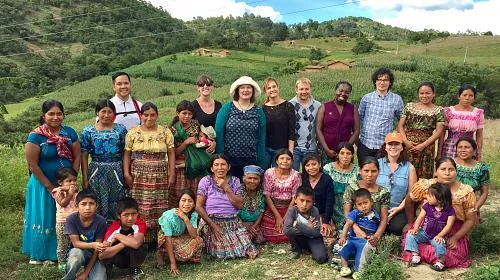WASHINGTON (August 4, 2017) – A delegation of CARE citizen advocates from around the United States traveled to Guatemala for a three-day learning tour to witness the reach, scope and sustainable impact of U.S. foreign assistance programs. This trip provided advocates with the history and context they needed to understand Guatemala’s current health and development landscape, as well as an immersive advocacy training to be utilized back in their home districts and communities.
“We travel with delegates to show them the impact of U.S. foreign assistance programs on the ground, but we come home from every trip inspired to see how people are helping themselves,” said Ellen Carmichael, deputy director of citizen advocacy at CARE. “These programs, including those implemented by CARE, are transforming the lives of individuals and communities. With relatively small investments, they multiply the impact beyond anything we ever imagined.”
CARE has operated in Guatemala since 1959 alongside other humanitarian, public and private sector organizations. With a population of 16.3 million, its growing economy is the largest in Central America, yet an estimated 55 percent of its population still lives in poverty. In indigenous communities, that figure can exceed 70 percent. Guatemala is struggling to feed its rapidly growing population, and currently has the highest malnutrition rate in the Western Hemisphere. In addition, nearly 40 percent of the population lives in poor, isolated and rural areas that lack basic services like clean water, sanitation facilities, education and health care. In these circumstances, women and girls suffer disproportionately, where issues such as gender-based violence, early marriage and the unmet need for family planning services are a major concern. In fact, 22 percent of women ages 15–19 have been married, and among this group, 26 percent report an unmet need for family planning.
During the trip, the advocates met with Ada Zambrano Aguirre, country director for CARE Guatemala, as well as representatives from the United Nations Population Fund (UNFPA) and indigenous women’s movement organizations, to understand the impact of poverty on rural communities and the transformation that occurs through investments in international development.
The advocates also met with:
- Village Savings and Loan Association (VSLA) members and community agricultural promoters who addressed food insecurity and resilience in the Quiché Dry Corridor;
- Leaders of the indigenous and native women’s movement in Guatemala to learn about CARE’s programs to promote, defend and exercise their individual and collective rights;
- Adolescent girls and parents from an educational program that empowers young women and addresses socioeconomic disadvantages; and
- Indigenous girls from a leadership program that empowers girls through educational programs on reproductive health.
Lastly, the advocates toured family farms, held in-depth dinner discussions with leaders of the indigenous women’s movement and spoke with directors and participants in CARE-supported programs, like Hope for Young Women, that aim to reduce socio-economic disadvantages and ethnic labor discrimination suffered by indigenous and rural women.
The advocates returned to their U.S. home districts with a clearer understanding of the powerful impact made by small investments from the U.S. foreign assistance budget, especially when invested in the lives of women and girls.
Representing CARE’s citizen advocacy fellows for 2017, the group included:
- Dan Berger, Philadelphia, PA
- Josh Burns, Spokane, WA
- Kimber Huntington Webb, Vancouver, WA
- Christabel Cobbina, Charleston, WV
- Kristen Pratt, Los Angeles, CA
ABOUT CARE
Founded in 1945, CARE is a leading humanitarian organization fighting global poverty. CARE places special focus on working alongside poor girls and women because, equipped with the proper resources, they have the power to lift whole families and entire communities out of poverty. Last year, CARE worked in 94 countries and reached more than 80 million people around the world. To learn more, please visit www.care.org.
Media Contacts
Nicole Ellis, +1-202-560-1791, nicole.ellis@care.org

